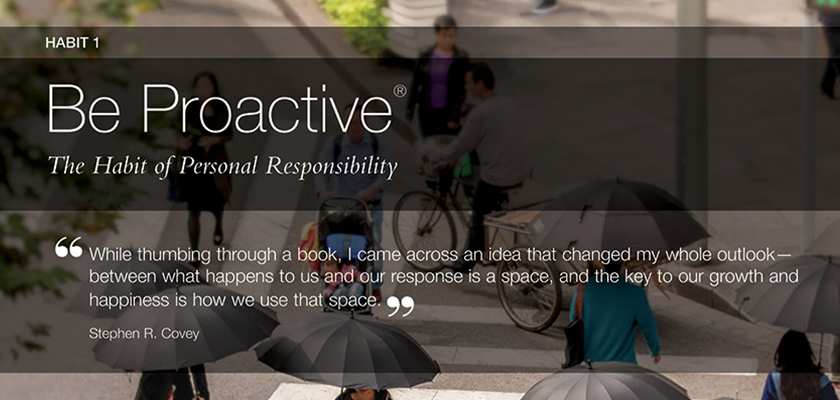Habit 1: Be Proactive®
The Habit of personal responsibility.
Habit 1: Be Proactive means more than taking initiative. It means we are responsible for our own lives. Our behavior is a function of our decisions, not our conditions. "Response-ability" is the ability to choose your response. Highly proactive people do not blame circumstances, conditions, or conditioning for their behavior. Their behavior is a product of their own conscious choice, based on values, rather than a product of those conditions, based on feeling.
“I am not a product of my circumstances. I am a product of my decisions.” - Dr. Stephen R. Covey
Reactive people are often affected by their physical environment. If the weather is good, they feel good. If it isn't, it affects their attitude and performance. Proactive people carry their own weather with them. They are still influenced by external stimuli, but their response, conscious or unconscious, is a value-based response or choice.
The freedom to choose.
Proactive people focus their efforts on their Circle of Influence. They work on the things they can do something about: health, children, or problems at work.
Reactive people focus their efforts in the Circle of Concern--things over which they have little or no control: the national debt, terrorism, or the weather. Gaining an awareness of the areas in which we expend our energies is a giant step in becoming proactive.
"The proactive approach to a mistake is to acknowledge it instantly, correct and learn from it." - Dr. Stephen R. Covey
Watch: Circle of Influence, from FranklinCovey’s All Access Pass®.
Related articles
See all our articles
November 16 2021
Focus on Your Circle of Influence
November 16 2021
8 Ways to Better Manage Ambiguity and Uncertainty
November 11 2021
Work/Life Balance For Leaders

